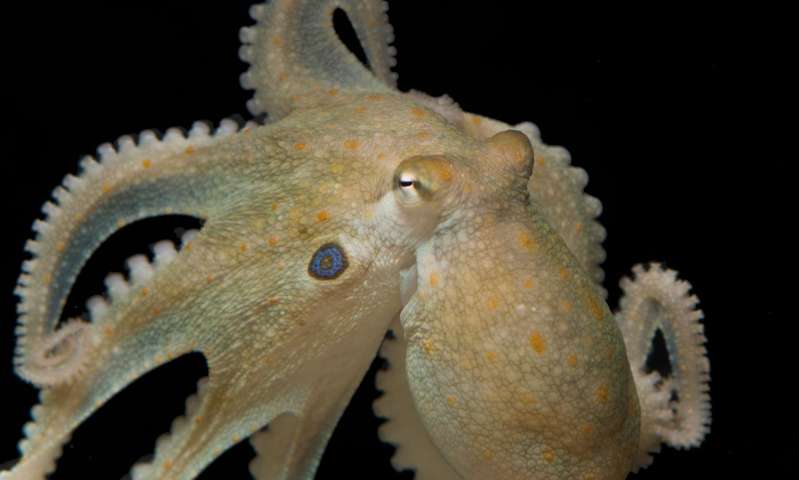
Octopuses can edit their own genes to alter their evolution.
New research shows that octopuses and other cephalopods have a tremendous capacity to alter and edit their own genes, which scientists believe to be the reason behind their shocking intelligence and ability to learn.
If you’re an animal and you’re intelligent, you probably aren’t a mollusk. Humans of course, dolphins and whales and pigs and crows – they all have large, centralized brains and a spinal cord to send neural messages down.
But worms, bivalves, snails… none of these things are known for their smarts. But their fellow mollusks, the tentacled cephalopods, are different. Cuttlefish, squid and particularly octopuses are known for their exceptional intelligence.
An octopus really shouldn’t be intelligent by all rights. Their brains have 1/20th the amount of neurons as humans, and it isn’t centralized in their body. Instead, they have a miniature brain in the bases of their arms.
And yet the octopus has both short and long-term memory. It can solve mazes and other simple problems. They’ve been observed using tools and building things. While their intellect is well-known, scientists have struggled to understand why such prodigious intelligence manifested in such an unlikely creature.
New research from Tel Aviv University (TAU) in Israel and the international Marine Biological Laboratory (MBL) may have our answer. Cephalopods have been found to be able to edit their RNA at extreme speed, allowing for rapid adaptations to environmental challenges.
What does that mean? Think of it like this. Your genetic code consists of DNA and RNA: DNA is the architect and RNA is the construction workers. DNA is a stable blueprint of what makes you you and RNA is what translates those blueprints into a physical being.
But construction workers don’t have to follow a blueprint exactly, and RNA doesn’t always do exactly what DNA bids. This process is known as “RNA editing,” and every organism does it to a certain extent in response to environmental pressures.
“About 25 years ago, people identified the first example of RNA editing in mammals. There were a few cases where you’d see the DNA saying one thing and then see the actual protein was different,” says study co-lead Eli Eisenberg, a biophysicist at TAU, in a statement.
“For us, generally when we have a gene, the coding can be improved through mutation. That’s the general picture of evolution, where a mutation comes along to adapt the protein to the needs of the organism. But when you change the DNA, it’s hardwired. You change it, and that’s that.”
Eisenberg also said that humans have about 1,000 spots on our genetic code which are sites likely to undergo RNA editing – but most of those spots are located along what’s called “junk DNA” that doesn’t code for anything. Fewer than 100 sites of likely RNA editing would actually do us any good.
By comparison, squids (whose genome is roughly the same length as humans) have 11,000 of these sites. The researchers found a correlation between the intelligence of the cephalopod and its number of RNA editing sites: squids and octopuses had more while the more primitive nautiluses had less.
RNA editing is most likely to occur in brain tissue, giving the species tremendous flexibility in adaptation. “You might edit the RNA in one tissue, say, the brain, and not in another, like the muscle,” Eisenberg explains. “You can have the old protein produced under normal conditions, and a new one when you’re under stress. You can edit it or not to varying levels – you can have the edited and unedited version in the same cell, working together.”
The trade-off here is that more flexible RNA means less flexible DNA – and DNA alters between generations, rather than within one organism. In other words, while individual octopuses may be better-suited to responding to pressures than humans, the species as a whole would be much slower to respond.
Eisenberg says he’s excited to continue the research on cephalopods to better understand this unusual ability of theirs. It isn’t totally certain that RNA editing is what gives octopuses their intelligence, but “that would definitely be my guess,” says TAU researcher Noa Liscovitch-Brauer. “It makes for a very compelling hypothesis in my eyes.”













